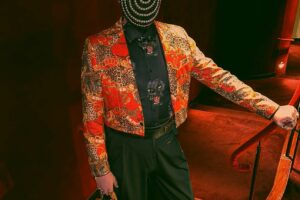

So, during the performance of Menotti’s The Telephone, when soprano Aine Hakamatsuka asked me if I wanted to take a selfie with her, I felt too embarrassed to say no. I didn’t want to come off as rude, or stingy, or worse—a diva (think of Axl Rose demanding that Google remove from the Internet an image of him looking zaftig onstage). Ultimately, my desire to be polite overwhelmed my vanity.
This experience is not unique. Practically every moment of my adult life has been documented and published on the Internet—whether I wanted it to be or not. And I’m not even famous. The practice of snapping pictures and posting them is far too ubiquitous to control. We are unendingly self-reflexive, and older generations accuse people my age and younger of wallowing in our own narcissism. Phones are everywhere—in restaurants, in theaters (think of the poor audience members harangued by Patti LuPone), and even in classrooms.
My point is not to weigh in on whether this is a natural evolution of technology or the doom of culture, but to highlight the concerns of Opera Upper West’s recent double bill, which had two performances this weekend. Aptly called The Cell, the company paired Gian Carlo Menotti’s The Telephone with Poulenc’s La voix humaine (a familiar combination), and staged them within an immersive setting at Café Tallulah on Columbus Avenue.
In light of our addiction to smart phones and tablets, the prescience of these composers is quite remarkable. Composed in the 1940s and 1950s, both pieces provoke and participate in a wide range of 20th century imagery as diverse as the gossipy teenagers from Bye Bye Birdie to Fassbinder’s The Bitter Tears of Petra von Kant. How keenly both Menotti and Poulenc perceived the future, and the alienation inherent to technological mediums of communication. While Poulenc’s La voix humaine conjures images of dependence and obsession, Menotti’s The Telephone considers the more comedic aspects of Eros and interruption. In both pieces, the body’s untidy longings are corralled, teased, and limited by the whizzing efficiency of machines.
However, as contemporary as these concerns might be, Opera Upper West’s performances were disappointingly retrograde. Failing to engage new ideas in innovative ways, they relied far too heavily on expected tropes and images. Staged by the company’s artistic director, Alexandra Fees, in the acoustically resistant lounge at Café Tallulah, the performances of The Telephone and La voix humaine merely parroted clichéd talking points. The introduction of “immersive” tweets, selfies, and mobile phones did little to illuminate the conundrums posed by these works, and felt more like a gimmick than an actual thesis. Overall, there was a resistance to a controversial point of view. As such the performance functioned more as an opportunity for the young singers, and not as reinvestigations of the imaginative spaces mapped out by Poulenc and Menotti.
The result is that instead of looking at The Telephone and La voix humaine through a lens of artistic merit, The Cell felt instead like a student performance—complete with an electric piano, played competently by Jeremy Chan—and not as a chance to consider the pieces on their own terms, what they contribute to the problems vexing our current time and place.
Regarding the singers: the three performers suggested nascent talent that had yet to be nurtured to its fullest potential. In The Telephone, an opera about a marriage proposal consistently interrupted by the ringing phone, Hakamatsuka and Clayton G. Williams, as Lucy and Ben, both demonstrated fine voices hampered by poor technique. This was especially true of Hakamatsuka, who clearly posses a beautiful sound, but fails to finish her phrases cleanly.
Moreover, both singers did not develop their characters beyond the trite stereotypes of a loquacious young lady and her sexually frustrated suitor. Williams’ temperament remained far too polite throughout the opera’s narrative, never quite embodying the frustration and anxiety his character experiences. And Hakamatsuka refused to elevate Lucy beyond the caricature of a teenaged gossip hound. Her tendency toward indication was especially troublesome, robbing the character of a consistent trajectory throughout the opera.
Having experienced The Telephone’s comedic take on the alienating aspects of technology, I found that Jin-Xiang Yu provided a startling departure as Elle (she who shall not be named) in Poulenc’s La voix humaine. Her performance was remarkable for its conviction, guts, and endurance. And her voice, while at times awkwardly handled, is an instrument worthy of attention.
As a woman desperate to win her lover back through a telephone conversation, Yu’s Elle was a truly repulsive creation, pleading and demanding the attention of a silent interlocutor. As she lay on the floor in a fetal position, the detritus of shredded photos and letters surrounding her, I could not look away—from empathy or disgust, I’m not sure. As I watched her body, writhing in its need for touch, separated by the indifferent surface of a machine, La voix humaine invoked the cruelty of modernity. Whether this was due to the work of Fees and Yu or the general qualities of the actual opera, I’m not sure. However, the performance by Yu was compelling—and for this the artist deserves admiration and praise.
But in the end, I wished that Yu had been given the opportunity to explore the role in a more competent production, complete with orchestra and precise staging. It would be interesting to see what kind of creative instincts might kick into gear for her in a more expansive setting.
When I left the café and headed home on 71st street, I called my partner. As we chatted about the afternoon, the connection on my iPhone kept going in and out. I couldn’t help but roll my eyes at the spooky coincidence. Connection, interruption, and frustration. Here we are, yet again. Menotti and Poulenc had it right. If only Opera Upper West could be so forward thinking.


























Comments